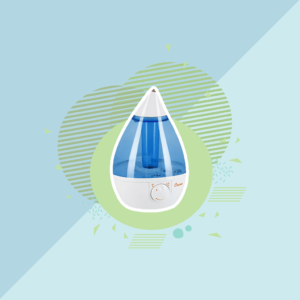Should I Buy A Humidifier?
If you’re wondering whether or not you should buy a humidifier, then chances are, you probably need one. In order to make sure that purchasing a humidifier is the right choice for you, though, it’s important to understand both how humidifiers work and their potential advantages and disadvantages.
In this article, we’ll look at some of the most important aspects of using a humidifier and will also consider some of the most commonly experienced benefits to help you decide whether or not you should buy a humidifier for your home.
What Is a Humidifier and How Do They Work?
A humidifier is a device used to add moisture to the air in your home. In winter, dry air can cause a range of problems, so it’s important to add moisture to the air when relative humidity levels drop. Purchasing a humidifier is undoubtedly the most effective way to increase the humidity levels in your home. They’re available in a range of types and sizes, from portable single-room models to larger whole-house versions.
For the most part, humidifiers work by evaporation. Inside the humidifier, a reservoir contains water that is dispensed into an internal basin. From there it’s absorbed by a special absorbent filter. A fan blows air through this filter, resulting in moistened air. Inexpensive and self-regulating, evaporative humidifiers are the most common and one of the easiest types to use.
The more humid the air becomes, the less moisture it will absorb and the less water vapor your humidifier will release. You can also purchase steam humidifiers that create a warm mist and ultrasonic humidifiers that use ultrasonic frequencies to create water droplets that are then dispersed by a fan.
Why Does The Air in Our Homes Become Dry?

You might think that the dry air in your home is caused by your home heating over the winter time, which is close to correct. It is not the heat; rather, it’s actually the winter cold that is responsible for such low humidity levels.
Cold air absorbs less water than warm air, so the cold outdoor air around your home is going to have a low humidity level. When this cold air enters your home and gets heated up, the warm air expands. This means the relative humidity level drops even further as there’s now less moisture per square foot.
In fact, whenever the air outside drops below freezing, the relative humidity inside your home will drop below 20 percent unless you take action. This is significant when you consider that the ideal relative humidity levels for your comfort and health are around 40-60 percent. If you live in a desert state, the air will naturally have lower humidity due to environmental factors all year round.
What Are The Benefits of Using a Humidifier?
A low humidity level can encourage an increased occurrence of colds and flu; it can also lead to irritated sinuses. Increasing the humidity level then, can:
Improve the Health of Your Skin
Your skin tends to dry out over cold winter months, making it more fragile and prone to irritation. Dry air absorbs moisture from our bodies, so if you already suffer from skin conditions such as eczema, dry winter air combined with strong heat sources can lead to increases in irritation.
A humidifier will prevent your skin from drying out by replacing moisture in the air inside your home. This increase in humidity means that the air in your home will be less dry, and will absorb less moisture from its surroundings – including your skin.Even if you don’t suffer from dry or irritated skin, using a humidifier in your home can still work wonders for your complexion, giving your skin a healthy, dewy glow. They’re even recommended by aestheticians for improving your skin quality, helping to calm acne-prone skin, reducing the signs of aging and helping skin to retain its youthful glow. Painful, chapped lips will also drastically improve.
Compared to the price of expensive facial creams, all designed to lock moisture into your skin, a humidifier is an inexpensive purchase that will prevent your skin from drying out.
Help Prevent Colds & Flu
Studies have shown that using a humidifier can help to reduce the likelihood of catching colds and the flu. Of course, if you’re surrounded by people coughing on public transport or in stores you’re still going to catch something. Nevertheless, using a humidifier at home and at work can significantly reduce the chances of you catching a virus.
Scientists have found a link between low humidity levels and the survival and transmission of influenza. Keeping your home and workplace at an improved level of humidity will make your surroundings less favorable for the survival of the virus, thereby reducing the likelihood that you’ll catch it.
Overly dry air is believed to facilitate the spread of colds and viruses in general. Every time we cough or splutter, clumps of fine particles are released from our noses that can transmit the virus to others. In damp air, these groups of particles tend to remain intact and fall to the ground. When the air is dry, though, they have a tendency to break up and remain airborne for a much longer period, which means you’re much more likely to breathe them in. Scientists have also found that drier air seems to enable viruses to stay active for longer too.
Relieve Irritated Sinuses
On top of keeping your skin hydrated and helping to keep colds at bay, using a humidifier in your home can also help to alleviate irritated sinuses. Low humidity levels can dry out your fragile sinus passages and lead to discomfort, sinus pressure, and headaches.
Restoring humidity levels will soothe your sinuses and keep your nasal passages and throat moist. This will also help you to better fight off any lingering germs and speed up recovery from colds.
Encourages Better Sleep
Dry air can disturb your sleep by drying out your nasal passages. When you can’t breathe comfortably, you may find yourself waking up frequently and needing to drink water throughout the night.
If your partner snores, you may find that lower humidity levels exacerbate this and their snoring will wake you up more often than usual. Lower humidity levels can cause your throat to swell slightly and result in nasal congestion, restricting airflow through your nose. This results in an increased likelihood of breathing through your mouth, leading to snoring. Increasing the humidity levels can help to reduce snoring by easing the dryness.
As a result, using a humidifier in your bedroom can help you get a better night’s sleep. A good night’s rest is crucial for your health and wellbeing, especially with all of the extra problems that winter has a tendency to throw at you.

Make Your Home Feel Warmer
Increasing the humidity levels in your home can actually help you to feel warmer, which can result in you turning down the heating and saving money on your energy bill.
When humidity is high, the air is heavily saturated and cannot absorb any more moisture. Our bodies cool down by evaporation – so, when the air is highly saturated, such as before a thunderstorm, we tend to feel warmer even though the temperature is not any higher than before.
Therefore, raising humidity levels will make you feel warmer without needing to actually increase the temperature. What’s more, you can save on your bills over the winter period because using a humidifier costs much less than traditional heating.
Protect Your Wooden Furniture and Fixtures
Chances are you probably have some wood in your home, a wooden table, parquet flooring, maybe some paneling, or just a few chairs. Just like our skin, wood can also suffer at low humidity levels.
Avoid cracks and splitting in furniture, doors and moldings by using a humidifier. Unless you’ve got some priceless antiques, this isn’t going to be enough on its own to sway you, but after considering some of the fantastic benefits to be had by using a humidifier in your home, we feel this is a nice extra bonus effect of increasing your home’s relative humidity level.
Support Healthy Houseplants
Most households have low humidity, but there are many houseplants which struggle in these conditions. Lots of popular houseplants originate from tropical regions which are known for humid environments, therefore, these species are not comfortable in dry air conditions.
Low humidity can cause certain houseplants to grow slowly and suffer issues such as leaf loss and trouble flowering. By introducing a humidifier to your home, your favorite houseplants can enjoy a more supportive environment and thrive in the improved conditions.

What Are The Downsides To Using a Humidifier?
We’ve considered all of the positives, so it’s only right we should take a look if there are any negatives to using a humidifier.
Cleaning
While humidifiers are relatively inexpensive, cheap to run (especially when you take the saving on energy bills into account) and help us to stay healthy and comfortable, they do need to be cleaned regularly to keep them functioning at their best and to prevent a build-up of mold and bacteria.
It’s for this reason you may have heard people say that humidifiers are hazardous. In truth, the same could be said about just about any appliance if used incorrectly. Humidifiers offer so many benefits, that they easily justify a small amount of time spent on cleaning.
A correctly maintained humidifier is very good for your health, comfort, and well being so long as it’s regularly cleaned. It may help to use distilled or demineralized water in your humidifier to prevent any mineral buildup that could make cleaning the inside of the humidifier more difficult. Some humidifiers have detachable parts that can go straight in your dishwasher, making this process even less hassle.
Risk of Burns
Warm mist humidifiers heat water and emit it as steam into the room. These appliances can become very hot and present a risk of burns of they get touched or knocked over. For this reason, it’s best to avoid this type of humidifier if you have pets or small children. Ultrasonic and cool mist humidifiers are a safer choice in these circumstances.
Noise
Some fan-based evaporative humidifiers can be quite noisy, so aren’t suitable for bedroom or office use where they could become distracting. Choosing an ultrasonic humidifier is one way to avoid this issue because they are almost silent in their operation and thus perfect for use in the bedroom for a peaceful night’s sleep.
Final Thoughts
So, should you buy a humidifier? The benefits of increasing your home’s humidity levels are far-reaching and can really make a difference to your day-to-day comfort and happiness. Not to mention potentially saving you money on your energy bills, helping you sleep better, and giving your complexion a dewy glow.
All in all, if you’re struggling with the winter blues, getting yourself a humidifier will go a long way to improve the health and well-being of you, your family and your home.




